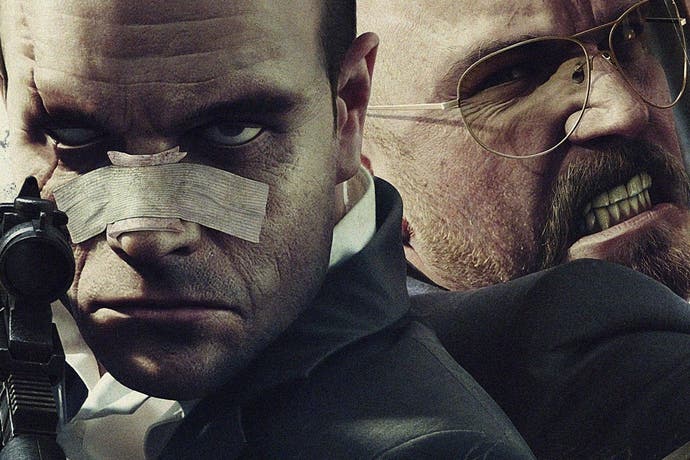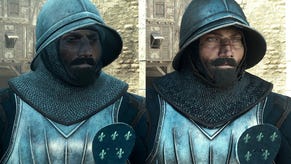Kane & Lynch: Dead Men retrospective
PsychIOpathology.
Nobody ever sets out to make a bad game. It's easy to forget that. IO Interactive recently laid off half of its staff, following a series of releases in this console generation that - simply put - didn't deliver commercially or critically. The main culprits? A pair of stone-cold killers - Kane & Lynch: Dead Men.
IO as a major studio was built on the back of an unsmiling contract killer - yet Hitman, in one of those twists reserved for games alone, became known as a great comic turn. Death had never been so deadpan. In the first throes of the 360 and PS3 generation the dream ticket for AAA developers, as it always is, seemed to be a more completely cinematic experience. Hitman may have an overarching plot, but you'd never say it had narrative ambitions. Kane & Lynch is all about them.
I make these points not as the prelude to claiming this is a forgotten masterpiece. Even at release Kane & Lynch was a dinosaur in many important respects. Despite its narrative drive the tools used are cutscenes and voiceovers. The core mechanic, an automatic cover system, is almost embarrassingly unresponsive.
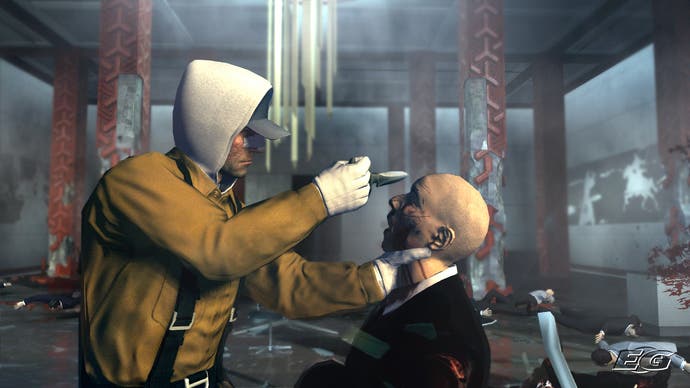
Such details suggest IO had a torrid time making the transition to the current generation of hardware, and the production values confirm it. Kane & Lynch's lighting, for example, is basically absent when it comes to dark areas, and fiddling with the brightness and gamma to compensate merely shows why - what's being hidden behind toneless black is texture-free spaces, cobbled-together corridors in a game full of them. The sound levels make staccato leaps, while Kane's voice actor has obviously been recorded at different times with different equipment; some lines sound like they were literally phoned in.
So Kane & Lynch is far from a great game, and really not even a good one. But what remains singularly curious about it is the atmosphere. This is a nasty world, full of death and gratuitous brutality, and devoid of anything we might call feeling. A cynical play for shock value in an industry that often rewards it, or the simple result of developers sick and tired of violence in a clown costume?
Or maybe it's something else. The biggest influences on Kane & Lynch are, unsurprisingly, cinematic, most notably the films of Quentin Tarantino and Michael Mann. The borrowings from these, it must be said, are often rather graceless. Throughout the course of the game we see the criminal crew in their Reservoir Dogs suits, chasing down a mysterious briefcase, arguing with each other in front of hostages, and coldly stalking their prey through a lurid, bouncing nightclub.
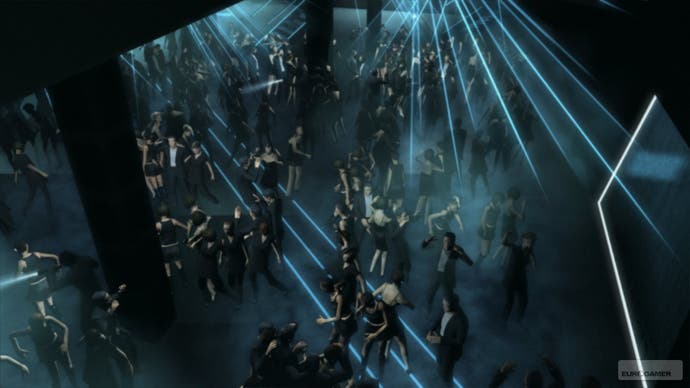
What is fascinating in such a context is what Kane & Lynch doesn't do. The films it echoes are fantasies that glorify crime and humanise murderers, which is why we're sad when Vince Vega dies. He killed all those people, but man what a great dancer. These characters show deeply human sides, as well as doing horrible things.
Kane & Lynch doesn't ever humanise its characters, and that's not just because the script is lousy. Instead it plays on that expectation an audience has for this kind of emotional reveal. Kane & Lynch never do anything heroic, never mind charming, but that doesn't mean you don't expect them to. In its own way it's a kind of setup, and one that takes aim at another ever-present trend in games with cinematic ambitions - one that most often finds expression in that ultimate of red herrings, the moral choice.
Player choice as a defining narrative tool, particularly as it existed in 2007, is rarely executed convincingly - that year's marquee title, for example, is surely the original BioShock. Kane & Lynch does not have the wit or means to skewer such a folly, bound up as it is in the unimaginative form of the third-person shooter, but the game understands on some level that this kind of choice is a folly. The player only ever plays what has been long ago decreed.
So Kane & Lynch, and its sequel, are about what happens when risks don't pay off. When murderers aren't secretly nice guys. To play through this is a depressing experience, the narrative drumbeats no more than violence atop violence. It's so unrelentingly bleak and without ceremony that at times it almost - almost - becomes comical. Your wife's brains get blown out in front of you. Your daughter dies. Hostages die, your buddies die, the bosses die... Almost everybody dies.
At the start of Kane & Lynch you see a prisoner on death row, taking this last chance to write a letter to his daughter. Kane finishes writing and folds the paper carefully. The whole game is about nothing less than destroying that last connection with humanity - for whatever reason.
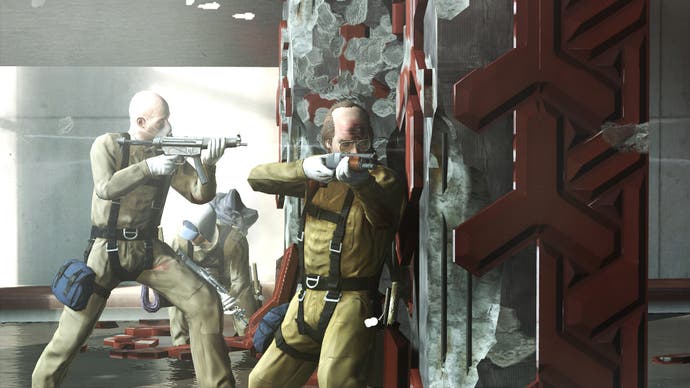
At the end of Kane & Lynch you make a moral choice. Kane can either fly away on a chopper, abandoning everyone but saving his daughter, who then hates him. Or he can do what most of us would surely agree is the 'right' thing - stay and help his men. Choose the latter, and everyone dies anyway. Throughout the final moments Kane's daughter gets shot and, as he drags her to a boat panicking, Lynch gets shot too.
At this point the game abandons its gritty visuals, and almost moves into silhouette. Kane takes out the letter and begins reading it to his daughter, as her lifeless head lolls on his arm. The stylised boat floats away. Kane is the last man standing: disfigured, brutalised, driven crazy, and deserving of it all.
This is a brutal vision, and one not without atavistic power. You could consider Kane & Lynch a spectacularly deadpan response to the narrative disconnect that still plagues third-person shooters. It is the logical endpoint to one of gaming's most persistent fantasies, the man with a gun blowing away 300 foreigners then smiling like Indy and getting the girl. Well, IO's got yer Nathan Drake right here.
By far the most striking feature in Kane & Lynch is how you bleed out after taking too much damage. While waiting for an ally, semi-random dialogue begins to play through Kane's mind; a cacophony of ghosts and missed opportunities. "You always f**k up Kane. Always." How unusual for a big-budget console game to subvert choice in order to talk about failure - about how the best-laid schemes of mice and men never go to plan. How desperately sad, and fitting, that it was one of them.
